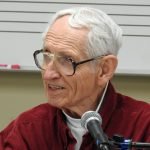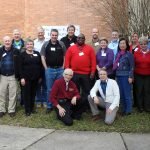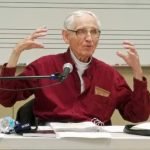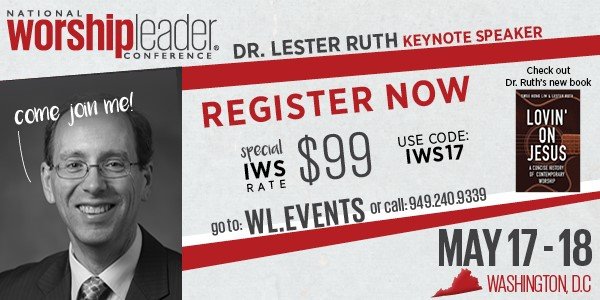From the Editor: Worshiping More and More
By Kent Walters, D.W.S.
 But I will hope continually
But I will hope continually
and will praise you yet more and more.
My mouth will tell of your righteous acts,
of your deeds of salvation all the day,
for their number is past my knowledge.
(Ps 71:14-15 ESV)
“Continually. . . more and more. . . . All the day.”
The psalmist’s life was consumed with steadfast confidence, declarative praise and unquenchable awe. I want to live like that, and, in so doing, faithfully declare God’s power to the next generation (Ps 71:18).
In some small way, may this edition of Anamnesis inspire you and the rest of the IWS community (which, after this June will include over 500 graduates!) to live a life of wholehearted worship in the pattern of the psalmist.
By the way, the word “inspiration” is a common descriptor voiced by worship seminar attendees. The June 19-20, 2017 seminar promises more of the same! We are privileged to welcome Dr. Lester Ruth back to campus for a seminar on the history and development of contemporary worship. It will likely be one of our best attended seminar events. Read the articles below and get your registration in.
Beyond reading the articles, stories and announcements in this edition, I encourage you to follow the numerous links you will find below to discover resources and, hopefully, blessings for your life and ministry. Let’s start with these:
January 2017 Media (session sermons, readings, music)
January 2017 Session Worship Bulletins
IWS YouTube Playlists. Access playlists from various sessions and themed categories.
Have you seen The Heart of IWS video testimonies from students and alumni? They are inspiring. Here’s one:
Additional IWS videos are available on the IWS YouTube Channel.
The National Worship Leaders Conference (May 17-18, 2017) is offering members of the IWS community a significantly discounted rate. If interested, get the IWS special rate code in the ad below. Scroll down.
The Lord be with you–more and more!
President’s Column: Worship and Culture
By James R. Hart, D.W.S.
This brief article is a somewhat condensed version of my presidential address from the January 2017 session of IWS. The purpose of the presidential address is to keep before the IWS community our God-given mission, and to explore various aspects of it. This session I explored some aspects of cultural reflections relative to the social teachings of the Church.
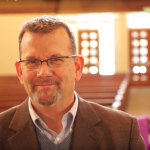 I am sometimes asked, “Why does IWS focus its studies on just worship?” Answer: a primary key to reading the entire biblical narrative is this—God is calling his creation to right worship. God ultimately wants his people to worship him aright. Because he needs our praise? No! He has no need of our praise. But, WE need to worship because in that great act we become aligned and reconciled to God through Jesus Christ, the primary worshipper. Right worship leads to the rightly ordered or integrated life, the rightly ordered family, church, city, culture, even cosmos.
I am sometimes asked, “Why does IWS focus its studies on just worship?” Answer: a primary key to reading the entire biblical narrative is this—God is calling his creation to right worship. God ultimately wants his people to worship him aright. Because he needs our praise? No! He has no need of our praise. But, WE need to worship because in that great act we become aligned and reconciled to God through Jesus Christ, the primary worshipper. Right worship leads to the rightly ordered or integrated life, the rightly ordered family, church, city, culture, even cosmos.
Bob Webber said, “Worship is the key to the renewal of the Church.” I have written this before, but it is worth repeating: In worship we have the great privilege of telling the world its true story, and bringing it to the right worship of the only God who is ultimately true, good and beautiful, reconciling us to him and each other. This is what IWS is about, and this is why the focus of IWS on right worship is at the very core of the Christian faith! . . .
Let us consider just one aspect of the intersection of worship and the Christian life: how the global church incarnates God’s desire to reconcile all things to himself through the primary means of worship and mission. I will focus on a few ways in which worship intersects with the Church’s social teachings, particularly related to militating against contemporary trends toward cultural accommodation and what I call cultural parochialism. [Continue reading. . .]
Robert Webber Column: How Will the Millennials Worship? A Snapshot of the Very Near Future
By Robert E. Webber, Th.D. (1933-2007)
 Bob Webber was born in Congo of missionary parents, and was raised in the Philadelphia area. From 1968 to 2000 he served as Professor of Theology at Wheaton College, and was named Professor Emeritus upon his retirement in 2000. He was appointed William R. and Geraldine D. Myers Professor of Ministry and Director of the M.A. in Worship and Spirituality at Northern Baptist Theological Seminary in the fall of 2000. He founded The Institute for Worship Studies in 1998.
Bob Webber was born in Congo of missionary parents, and was raised in the Philadelphia area. From 1968 to 2000 he served as Professor of Theology at Wheaton College, and was named Professor Emeritus upon his retirement in 2000. He was appointed William R. and Geraldine D. Myers Professor of Ministry and Director of the M.A. in Worship and Spirituality at Northern Baptist Theological Seminary in the fall of 2000. He founded The Institute for Worship Studies in 1998.
The following article was published 16 years ago in Reformed Worship. He wrote: “The future of worship can be caught in the phrase ‘ancient worship with a contemporary flare.’ . . . Millennials . . . want substance, depth, challenge, and encounter.” Did Robert Webber get it right? If so, how does our worship content measure up?
I just came from a faculty meeting where we were discussing the matter of perception. One of the faculty members who heads up the youth division remarked, “Age groups see things differently. For example, I live near Willow Creek Church. They just put up a sign celebrating their twenty-fifth year of ministry. The kids I work with weren’t even born twenty-five years ago. For them Willow Creek is tradition.”
For the young, “contemporary worship” as most of us know it is old hat. They are moving on to new approaches. In order to see what kind of worship leadership we may expect from the next generation, we’ll take a look at the generational profiles of Boomers, GenXers, and Millennials. [Continue reading . . . ]
IWS Community News: Personal Stories and Updates
How grateful we are for the increasingly significant impact of IWS students and graduates around the world! These 30 stories and updates serve not only to inform and keep us connected, they are tangible evidence of the broad reach of Bob Webber’s legacy through the school he founded.
Thanks be to God! [Read on . . .]
Populi, Moodle, and the Alumni Directory
By Sam Horowitz, Director of Technical Services, D.W.S. (Epsilon 2 2016)
 As a reminder, directory information (including for alumni) moved into the Populi system in 2013. Populi also works as the “master” for most of the passwords required to access the IWS system, including Moodle and your @iws.edu email account. Materials to familiarize yourself with these systems are available at https://iws.edu/resources/dts/.
As a reminder, directory information (including for alumni) moved into the Populi system in 2013. Populi also works as the “master” for most of the passwords required to access the IWS system, including Moodle and your @iws.edu email account. Materials to familiarize yourself with these systems are available at https://iws.edu/resources/dts/.
Remember that we have a Prayer/Praise forum and a regularly updated Job Board available for the entire IWS community in Moodle!
Please verify that the directory information we have on file is correct. Open Populi, then click on the My Profile tab and then the Info tab. A few notes:
- If you don’t remember your IWS password, visit https://iws.populiweb.com/ and click the “forgot password” link. If you need your username, contact registrar@iws.edu.
- Items marked with a star ★ in your profile info are the default contact information for you, including the IWS email lists.
- Items marked with a padlock ???? are visible only to faculty and staff.
- The Populi directory does not always show the best results for alumni searching for other alumni, so we built a temporary directory at https://secure.iws.edu/myIWS/directories.php until that function can be improved (it uses the same username and password that Populi does).
- Our system does not allow us to easily manage forwarding your @iws.edu email to another email address. If you do not use your @iws.edu address and would like it disabled, please let me know.
Thanks for helping us stay in touch with you!
Gerald Borchert Seminar Reflections
“[IWS] continues to be a model of what Bob Webber hoped to develop in his dream for an institution focused on a holistic approach to Christian life and worship” (Gerald Borchert, January 2017).
Dr. Borchert is Senior Professor of New Testament at Carson-Newman University, former Dean of two theological seminaries and Emeritus Professor, former Thesis Director and Trustee of IWS. An expert in the New Testament, his two-day seminar, The Portraits of Jesus: Models for Worship and Mission Renewal, was held January 9-10, 2017 on the campus of IWS. The increase in biblical illiteracy in churches today demands that Christians rediscover the centrality of Jesus in the biblical narrative. Dr. Borchert’s exegetical approach to several New Testament books uncovered portraits of Jesus as clues for developing authentic patterns of life and worship.
Attendees were generous in their response to Jerry’s teaching.
- Dr. Borchert is passionate about God’s word, engaging as a speaker, and a fountain of biblical insight.
- The seminar was a veritable feast. I anticipate cogitating on its contents for months to come.
- The seminar was excellent! Jerry is a venerable speaker. He clearly and candidly expresses his views on the biblical text and shows his ideas through textual support. His presentation is forceful and insistent.
- Dr. Borchert was engaging and a most amazing speaker. His content was wonderful and thought-provoking while also convicting.
- Dr. Borchert is a treasure.
After his time back at IWS, Jerry wrote:
It was a delightful privilege to return and lead the recent seminar at the Robert Webber Institute for Worship Studies. The contextual worship was thoroughly refreshing and the encounter with eager students, alumni and faculty was once again a marvelously enriching experience. The readiness of persons to learn, digest and dialog concerning interrelated theological ideas, particularly as they relate to worship, is a clear sign of an excellent theological environment. The responses and comments of the participants in my seminar were exceedingly heartwarming. The school continues to be a model of what Bob Webber hoped to develop in his dream for an institution focused on a holistic approach to Christian life and worship.
Here is a sample video clip [2:41] from the seminar. Dr. Borchert says, “Worship is part of the process of sanctification.”
Access additional media from the seminar: Audio and video files from the Gerald Borchert Seminar.
See additional photos from the seminar event here.
June 2017 Worship Seminar with Lester Ruth
 Dr. Lester Ruth, former co-instructor of DWS 701, will to return to IWS in June to speak for the Worship Seminar and also for the Commencement Service that will be held on Sunday, June 18 at 5:00 p.m. As always, IWS alumni are invited to bring their regalia and join the processional as honored guests at Commencement. Contact the IWS office to reserve your place.
Dr. Lester Ruth, former co-instructor of DWS 701, will to return to IWS in June to speak for the Worship Seminar and also for the Commencement Service that will be held on Sunday, June 18 at 5:00 p.m. As always, IWS alumni are invited to bring their regalia and join the processional as honored guests at Commencement. Contact the IWS office to reserve your place.
The June 19-20, 2017 seminar, When the Music Fades (or Not): Exploring the Historical Origins and Development of Contemporary Worship, will be based on Lester’s latest research as documented in his books Worshiping with the Anaheim Vineyard: The Emergence of Contemporary Worship and Lovin’ on Jesus: A Concise History of Contemporary Worship. The article below is an excerpt from one of the books. According to Dr. Ruth, except for the evolution of its music, the history of the emergence of “praise and worship” or “contemporary worship” has been little told. This seminar will attempt to do that. While acknowledging the importance of musical developments, the seminar will suggest that the history of the non-musical elements is just as interesting and just as important. Thus the seminar will be an interactive exploration of important musical and non-musical topics and issues in contemporary worship’s history, finishing with a pastoral and historical assessment of where contemporary worship stands as it enters middle age.
Additional details about the seminar and registration information are available here. Take advantage of the early registration discount and register by May 1.
Praise and the Presence of God
The following “seminar teaser” is an excerpt from Swee Hong Lim and Lester Ruth, Lovin’ On Jesus: A Concise History of Contemporary Worship (Nashville: Abingdon Press, 2017), chapter 8, pp. 123-4.
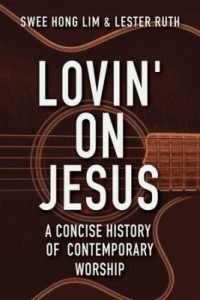 Take a survey asking people what biblical proof texts most strongly stand behind the rise of contemporary worship and there are bound to be a variety of answers. Many might point to “Sing to the Lord a new song” (Psalm 96:1; NIV) since the movement has spawned the writing of so much new music. Others who have adopted contemporary worship to achieve greater effectiveness in evangelism might point to I Corinthians 9:22 (“I have become all things to all people”; NIV) to support a willingness to try new styles in order to reach new peoples.
Take a survey asking people what biblical proof texts most strongly stand behind the rise of contemporary worship and there are bound to be a variety of answers. Many might point to “Sing to the Lord a new song” (Psalm 96:1; NIV) since the movement has spawned the writing of so much new music. Others who have adopted contemporary worship to achieve greater effectiveness in evangelism might point to I Corinthians 9:22 (“I have become all things to all people”; NIV) to support a willingness to try new styles in order to reach new peoples.
Both of those passages are possible contenders for the key biblical text behind the contemporary worship phenomenon. But there are two other possibilities that in the writings of those involved in the early decades of the movement are even more critical. Of these two passages the most vital would be Psalm 22:3, which states in the King James Version read by all the early theorists for contemporary worship: “But thou art holy, O thou that inhabitest the praises of Israel.” (Many recent translations speak of God being enthroned on the praises of Israel, a notion closely linked in some articulations of this theology.) Close behind the importance of Psalm 22:3 would be Psalm 100:4 which calls for worshipers to “enter God’s gates with thanksgiving and God’s court with praise.” More than Psalm 96:1 or I Corinthians 9:22 it is these latter two passages, both individually and linked together, that form the biblical foundation upon which much of the early forms of contemporary worship were laid. In tandem the two provide the explanation for this new phenomenon. Psalm 22:3 gave the movement its rationale for emphasizing the praising of God and Psalm 100:4 offered a biblical grounding for a liturgical order (from thanksgiving to praise to worship).
Together the two passages established a strong sense that God’s presence could be experienced in a special way through corporate praising and that sequencing acts of worship in certain way could facilitate the experiencing of divine presence and power. Once worshipers are aware of being in the presence of God, the natural response is one of adoring God. The roots for this line of teaching seemed to have first emerged in the late 1940s. By the 1980s the teaching had evolved into a system which could explain how and why sets of congregational songs should be put together in a certain way. In other words, by the 1980s the teaching had developed into a sacramental theology and piety explaining contemporary worshipers’ liturgical experience of encountering God in congregational singing during the worship set.


